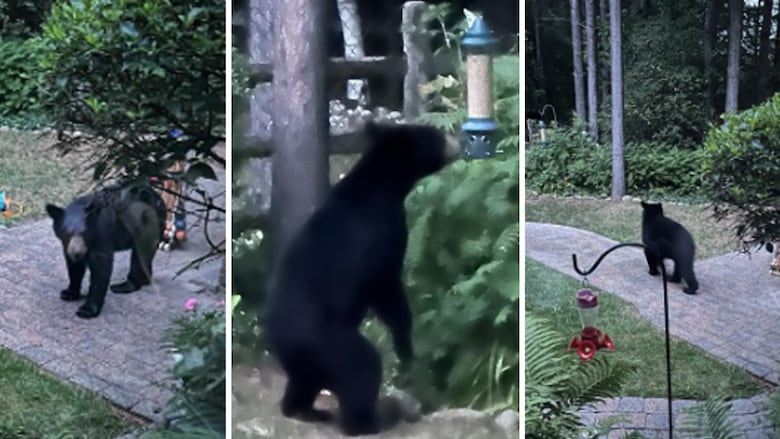Rare black bear sighting in Erin, Ont., prompts safety warning from police
'Usually they're harmless. They're just seeking food sources': Const. Kirk MacDonald

A small black bear has been spotted in Erin, Ont., prompting a warning from police.
Wellington County Ontario Provincial Police (OPP) said they received a report of the bear in a residential area of the town on Wednesday around 9 p.m. ET.
The bear was seen on properties in the area of Pine Ridge Road.
"According to some of the residents, a couple of the bird feeders were knocked over, which are a common target for bears," Const. Kirk MacDonald told CBC News.
A witness shared images of the bear with police.
Police say people should stay away from the bear and if it appears to pose an immediate threat to the public through threatening or aggressive behaviour, then call 911.
For non-emergency encounters, people can call the province's Bear Wise reporting line at 1-866-514-2327.
The Ontario Ministry of Natural Resources also shares tips for people who encounter a bear:
- Slowly back away while keeping the bear in sight and wait for it to leave.
- Throw objects at the bear, wave your arms and make noise to make the bear leave.
- Have bear spray on hand.
- Go inside a building or vehicle.
- Drop any food you may be carrying.
- Leave the bear alone if its in a tree. It will leave the tree on its own when it feels safe.
- Keep dogs on a leash.
- Don't run, climb a tree or swim away.
- Don't make direct eye contact.
- Don't attempt to feed the bear.
- Don't play dead unless you are attacked by a mother bear defending her cubs.
The ministry's black bear map shows it's rare for black bears to come into southern Ontario
Sightings happen 'from time to time'
MacDonald said while it's not a common sighting, it's not unheard of for a bear to be seen in Wellington County.
"It does happen from time to time. We do get calls usually in the spring and generally from the images and description of these bears — they're what are described as yearling bears and that means that they're no longer a cub, but they're not quite a full-grown adult."
At that age, the bears head out on their own and go in search of food, and sometimes that means they expand the territory they might normally be in.
"It's not too unusual that bears come down forested corridors from either the cottage country area or the Bruce Peninsula, which a lot of people are aware that there is quite a significant bear population [there]," he said.
"Usually they're harmless. They're just seeking food sources. But we put this out there more as an awareness for people, for their safety. And also we don't want any necessary harm to come to animals too. They usually move on."
He said police and the ministry recommend people not leave things outside that may attract bears.
"If there is bears spotted in the area, for example, they love bird feeders, they love garbage that may be exposed," he said.
"Just keep in mind they are wild animals. They will not go after humans.
"You may see a young bear, and think it's cute and kind of get up for the selfies and the close-ups, but just be cognizant that there could be an adult bear around that is protective of the young one," said MacDonald. "And that's where people could get themselves into trouble. But fortunately, bear attacks on humans are extremely rare circumstances."